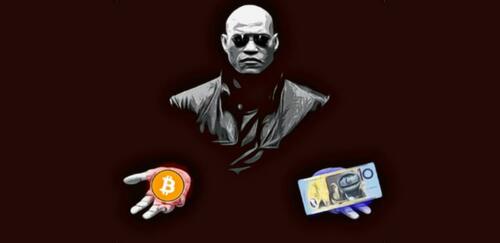
No matter the subject, it's never easy to accept the realization that one's world view is incorrect. For many smart and educated people like Michael Saylor it took years to get it. Bitcoin's underlying philosophy itself, and its implementation challenge many well engrained ideas. It's also not a minor subject, it shakes the foundation of what you hold to be true all your life.
Bitcoiners often get disappointed with nocoiners (people who don't have Bitcoin) when trying to orange pill them (open their minds to Bitcoin), because they don't seem to understand the obvious. I urge us to be patient and understanding.
Learn to recognize the "5 stages of grief" most people go through while detoxing from fiat, and help them through the hurdles with patience and with compassion.
1. Shock and denial 😲
Initially people can't accept that fiat money and the global monetary system is not what they thought it is. They can't accept that the official narrative they have been thought in school and have been fed by mass media doesn't tell the full story. It's shocking to realize one has been manipulated.
People also can't accept that a pseudunomous economist / programmer(s) (Satoshi Nakamoto) can discover digital scarcity, and reboot the world economy with a more efficient and more just monetary system that doesn't rely on centralized powers.
This stage can take a relatively long time, because one has to learn a quite a bit about bitcoin while being in denial.
2. Anger 😡
Once people get over the shock, they often get angry.
They are angry for being lied to by the system, but they are also upset because they assume they missed out on buying bitcoin early.
Some construct or buy into various narratives that Bitcoin is actually dangerous because it will replace the old established monetary systems, or because it uses too many resources to run, etc.
At one point though, people do come to accept that this is happening no matter what.
3. Bargaining 🧐
The next step for intelligent people typically is bargaining.
They will ask: can we roll back time, and instead of bitcoin use another crypto coin that they can buy into early, or can we make the properties of bitcoin different so they would fit one's personal preferences (that typically turn out to be shortsighted)?
This stage is very important because people will learn through questioning about legacy systems, the engineering decisions made for bitcoin, about complex incentive structures, and other deeper aspects of the subject.
4. Depression 😕
As people understand more about the economy, financial systems, political powers, money in general, inflation, etc. they get depressed.
There is a lot of uneccessary injustice, unfairness and cruelty going on in the world, and bitcoin doesn't seem to offer a quick solution to all these problems right away. Most people in the world haven't adopted bitcoin to any level in their lives. There are massive powers who are opposed to change. How will we ever get over these hurdles?
Fortunately, most people are strong in heart and not willing to give in or give up. Many move on to the last and most important stage.
5. Acceptance and hope 🤩
Once people realize bitcoin is not an instant or perfect solution to all ills in the world, but it is our only fair shot to fix things, they reach the final stage. They start to see bitcoin's true value and ingenuity, and how it can be the foundation for a new fair monetary and economic system. The future doesn't seem bleak no more. Hope returns.
At this point, people start to do what they can to help to push bitcoin forward:
-
Most adopt it in their lives for savings and for payments
-
Some start to run a node and provide liquidity to the Lightning Network
-
Some can't hold back the good news and start to talk to their friends about bitcoin
-
Some transition into jobs where they can work on bitcoin and its ecosystem
This entire process is difficult, yet extremely rewarding. It not only gives back hope in the future and improves one's financials, but that hope cascades into other areas of life like health, relationships, improved moral values, etc. People start to feel empowered to take charge and embetter themselves and their communities.
If you're a bitcoiner, I don't have to convince you about the above. If you're a nocoiner, you won't believe me until you experienced the change yourself. Good luck on your journey no matter where you stand! 🚀
No matter the subject, it’s never easy to accept the realization that one’s world view is incorrect. For many smart and educated people like Michael Saylor it took years to get it. Bitcoin’s underlying philosophy itself, and its implementation challenge many well engrained ideas. It’s also not a minor subject, it shakes the foundation of what you hold to be true all your life.
Bitcoiners often get disappointed with nocoiners (people who don’t have Bitcoin) when trying to orange pill them (open their minds to Bitcoin), because they don’t seem to understand the obvious. I urge us to be patient and understanding.
Learn to recognize the “5 stages of grief” most people go through while detoxing from fiat, and help them through the hurdles with patience and with compassion.
1. Shock and denial 😲
Initially people can’t accept that fiat money and the global monetary system is not what they thought it is. They can’t accept that the official narrative they have been thought in school and have been fed by mass media doesn’t tell the full story. It’s shocking to realize one has been manipulated.
People also can’t accept that a pseudunomous economist / programmer(s) (Satoshi Nakamoto) can discover digital scarcity, and reboot the world economy with a more efficient and more just monetary system that doesn’t rely on centralized powers.
This stage can take a relatively long time, because one has to learn a quite a bit about bitcoin while being in denial.
2. Anger 😡
Once people get over the shock, they often get angry.
They are angry for being lied to by the system, but they are also upset because they assume they missed out on buying bitcoin early.
Some construct or buy into various narratives that Bitcoin is actually dangerous because it will replace the old established monetary systems, or because it uses too many resources to run, etc.
At one point though, people do come to accept that this is happening no matter what.
3. Bargaining 🧐
The next step for intelligent people typically is bargaining.
They will ask: can we roll back time, and instead of bitcoin use another crypto coin that they can buy into early, or can we make the properties of bitcoin different so they would fit one’s personal preferences (that typically turn out to be shortsighted)?
This stage is very important because people will learn through questioning about legacy systems, the engineering decisions made for bitcoin, about complex incentive structures, and other deeper aspects of the subject.
4. Depression 😕
As people understand more about the economy, financial systems, political powers, money in general, inflation, etc. they get depressed.
There is a lot of uneccessary injustice, unfairness and cruelty going on in the world, and bitcoin doesn’t seem to offer a quick solution to all these problems right away. Most people in the world haven’t adopted bitcoin to any level in their lives. There are massive powers who are opposed to change. How will we ever get over these hurdles?
Fortunately, most people are strong in heart and not willing to give in or give up. Many move on to the last and most important stage.
5. Acceptance and hope 🤩
Once people realize bitcoin is not an instant or perfect solution to all ills in the world, but it is our only fair shot to fix things, they reach the final stage. They start to see bitcoin’s true value and ingenuity, and how it can be the foundation for a new fair monetary and economic system. The future doesn’t seem bleak no more. Hope returns.
At this point, people start to do what they can to help to push bitcoin forward:
-
Most adopt it in their lives for savings and for payments
-
Some start to run a node and provide liquidity to the Lightning Network
-
Some can’t hold back the good news and start to talk to their friends about bitcoin
-
Some transition into jobs where they can work on bitcoin and its ecosystem
This entire process is difficult, yet extremely rewarding. It not only gives back hope in the future and improves one’s financials, but that hope cascades into other areas of life like health, relationships, improved moral values, etc. People start to feel empowered to take charge and embetter themselves and their communities.
If you’re a bitcoiner, I don’t have to convince you about the above. If you’re a nocoiner, you won’t believe me until you experienced the change yourself. Good luck on your journey no matter where you stand! 🚀







